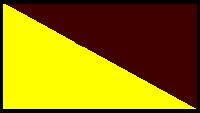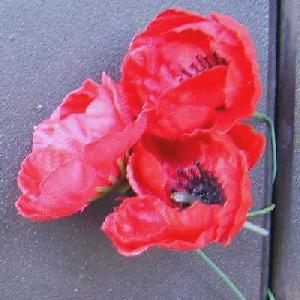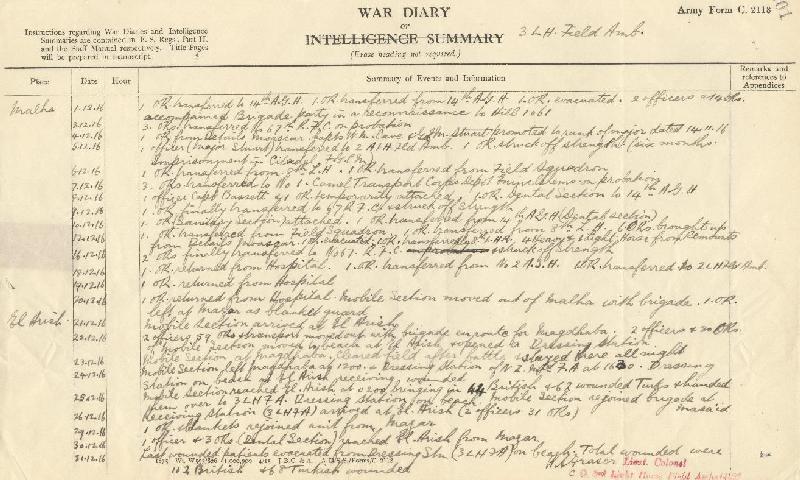MAGDHABA, DECEMBER 1916
Prior to the occupation of EL ARISH the Mobile Section of the Ambulance was camped with the Brigade at MALHAR, situated about two and a half miles South East of MAZAR. From this camp several reconnaissances were made and further, in order to prepare us for a quick move out. On a given signal the whole Brigade had to assemble at a fixed point within a given time. These alarms were plentiful consequently life at MALHAR was very unsettled. Moreover as the camp was in fairly close proximity to the enemy no lights were allowed after 1900 which fact did not tend to increase our comfort. In view of these alarms it was quite an understood thing that, when we did move out, no time was to be lost and very little warning would be given. This did happen and about 0900 the morning of 20th. DECEMBER 1916 orders were received to be ready to move out in half an hour’s time. Only just prior to this all the Christmas parcels, billies etc. had been received and it caused many heart burnings when practically all of these had to be dumped.
From MALHAR we travelled very light, carrying only one blanket and as little personal gear as possible. Rations for man and beast for 48 hours were also carried. We were given to understand that the stunt was to be of a very arduous nature consequently, in order to save our horses as much as possible, only absolutely essential things were taken.
About 1000 on the 20th. December we finally left MALHAR and rode all that day with the regulation halts until about 1800. Then we halted, watered and fed horses and rested for a couple of hours. Somewhere about 2030 we were on the move again, our objective being EL ARISH, We rode throughout the night till somewhere about 0300 next morning when a further halt was called. No definite instructions were received and all thought it to be only a regulation stop. However time sped on and at dawn the morning of the 21st we were still in the same position.
Throughout the night, although opposition was expected, none was encountered and it looked as though EL ARISH was to be taken without a shot being fired. This proved to be the case. Soon after dawn we were once more on the move and very shortly EL ARISH came in sight. We travelled as far as MASAID, arriving there about 1100, where the Brigade commenced watering the horses.
The supply of water there at the time was very meagre consequently it was decided to move on along the beach to a position about mid-way between MASAID and EL ARISH. We reached this spot about 1630 and orders were received to water our horses after the regiments. It was 0200 the next morning before all our horses were watered.
About this time (0200) word was received that we would be moving on again at daybreak with the consequence that the majority had little or no sleep that night. Further we were camped right on the beach and as the night was bitterly cold one blanket was hardly sufficient to entice sleep.
At dawn the morning of the 22nd. we pushed on and proceeded to a spot on the outskirts of EL ARISH on the S.E. side. Horse lines were at once put down and a good night's rest that evening looked forward to. Whilst we were watering the horses in the afternoon word was received to prepare to move at once so all hopes of a night’s rest were knocked on the head. Our objective this time was MAGDHABA which lies about 20 miles to the East of EL ARISH. We moved out about 1800 the party proceeding with the Brigade being composed roughly as follows:- Officers, Lt. Col. FRASER, Capt. EVANS about 20 bearers, 8 sand carts, 10 lying and 13 sitting cacolets, 2 sledges. In addition the Unit had to form a Receiving Station (Note that this Receiving Stn was formed from the Mobile Section) at EL ARISH and MAJOR WHITE with Capt. BASSETT and about 6 Other Ranks was left behind for this purpose. This party proceeded to a site near the beach taking with them all baggage camels carrying equipment, medical stores etc. They experienced a very trying time indeed which will be dealt with later on.
As stated before the party with the Brigade moved out at 1800 and proceeded along the bed of the WADI EL ARISH. After going about 3 to 4 miles we halted and rations were drawn and issued. Here we remained for some little time finally pushing on about midnight. We continued along the wadi bed in the direction of MAGDHABA. Owing to the loss of sleep the two previous nights all found it very hard to remain awake and, almost without exception, everyone at some time or other that night found themselves dozing in the saddle. Repeatedly men would shoot out in front of the unit and wake up with a start to find themselves among strangers. Only those who have experienced this can fully realize what a mighty unpleasant thing it is»to fight against sleep on a night ride. To add to the discomfort we were being initiated into our first experience of dust which arose in dense clouds the whole night through.
About dawn we reached the precincts of MAGDHABA and very soon our artillery got into action. Our planes were also very active and, as events proved after, their spotting for the artillery was excellent, many direct hits on the redoubts being obtained. At this time the Brigade was still in the wadi and continued to move forward slowly. Soon, however, more movement appeared and the Brigade pushed on at a smart trot which gradually increased to a gallop, the object being to surround MAGDHABA as far as possible. In all we galloped a distance of from 3 to 4 miles, finally halting on the low lying hills to the N.E. of MAGDHABA. The Brigade was soon in action and rifle fire was very heavy indeed. Whilst galloping into this position the Brigade was shelled but no casualties occurred.
The defences of MAGDHABA consisted of a series of redoubts and these lay in a basin surrounded by low lying hills. Our attack was so sudden and unexpected that no opposition was encountered until within range of these redoubts. Lt. Col. FRASER with the ambulance took up his position in a small valley and from on top of the high ground near by the whole of the operation could be seen. Several stray bullets commenced to fly about and here one of our horses was hit All the personnel were ordered to lie low and though several bullets passed through the sand carts fortunately no men were hit.
The led horses of the 8th. L.H. Regt. were also in this valley on our immediate right but they were not so lucky, several casualties occurred and LT. COL. MAYGAR'S groom was killed. The fighting still was severe and a few slightly wounded men came into the ambulance. Word of further casualties was received and Lt. Col. FRASER despatched sand carts to collect them. This proved most hazardous as it was necessary to take the carts down on to the front where cover was conspicuous only by its absence. Capt. EVANS proceeded with a sand cart to the 10th. Regt. and experienced a very rough journey and though all came through without any mishap it could only be put down to very good fortune.
At this time 6 horses constituted a sand cart team and it looked next door to an impossibility to take one down on to the flat without incurring casualties. Another cart went out to the 9th. Regt. and, in order to get there, the drivers had to cross an open space of from 6 to 800 yards. Right throughout this particular journey the bullets were licking the dust up on all sides (the cart went across the front of the redoubts) and it was miraculous that a safe trip was accomplished. The drivers of the cart (DVRS. CARLING, WALES & JANES) deserve great praise and were extremely fortunate that their lucky star was in the ascendency that day. Whilst loading this cart the bullets caused the team to play up and great difficulty was experienced getting the patients into the cart.
About 1500 the wounded still continued to flock in and they were despatched as quickly as possible to a Receiving Station established in the WADI EL ARISH about 3 miles from MAGDHABA by the N.Z.F.AMB.
The fighting now was going well in our favour and the C.O. decided to push on with the sledges to a more forward position. At a gallop the bearers and sledges went down the rise into the flat beneath and were greeted with a fair quantity of rifle fire. Simultaneously with this some of the Turkish redoubts commenced to surrender and in a very short time the whole garrison and MAGDHABA were ours. It was now about 1600. The C.O. learnt that there was a fair hospital building at the rear of the redoubts so he decided to make use of it. The casualties were fairly heavy and it was obvious that night would set in long before all the wounded could be collected and conveyed to the N.Z. Dressing Station.
From 1600 until about 0200 the morning of the 24th. our sand carts collected the wounded and took them to the hospital building at MAGDHABA. As all the medical equipments of the unit was left with MAJOR WHITE also the complete tent sub-division many difficulties now presented themselves. In all we had about 100 wounded men, many serious, with practically no equipment. The bearers had to turn to and act as orderlies and excellent work was done by them. Utensils of all descriptions had to be improvised and the place searched for coverings for the wounded. The night was bitterly cold and as all had had little or nothing to eat that day the outlook was far from pleasant. However all worked with a will and in good spirit and everything possible was done for the comfort of the patients.
About 0300 the morning of the 24th. MAJOR HERCUS, D.A.D.M.S of the Division arrived with a camel convoy on which were medical comforts. This enabled us to give all the patients a good hot meal in the morning.
An enemy plane appeared on the scene about 0900, dropping several bombs but no casualties occurred.
Throughout the night our camel cacolets arrived at MAGDHABA and these, with the sand carts etc., commenced to take the patients back to EL ARISH. The ride back to EL ARISH was tedious and long and it was not until the morning of the 25th. at 0200 that the last patient arrived. In all the unit had five consecutive nights in which practically no sleep was available.
Whilst the major portion of the unit was at MAGDHABA the party left with MAJOR WHITE at EL ARISH to form the Receiving Station had a very rough time. About 20 patients were admitted while the tents were being erected and of these one died before this initial job was completed.. Once, with their very small personnel, over 270 patients were in hospital and as a large number of these were seriously wounded the difficulties they were working under are obvious. Moreover their equipment was very limited, being only that of a mobile section, hence all manner of things had to be improvised in short order to carry on. The staff worked day and night almost continuously and are to be congratulated in the way in which they stuck to their job.
Although this period was of a most strenuous type for all the general health of the personnel was excellent and in a very short time none were any the worse for the loss of sleep and the many other privations undergone. After completion of this operation the unit camped at MASAID. It was not until the afternoon of the 25th. that the Immobile Section reached EL ARISH, the officers with them being Capts. CAVE & YUILLE. This section joined up MAJOR WHITE'S party and formed the Receiving Station at EL ARISH.







